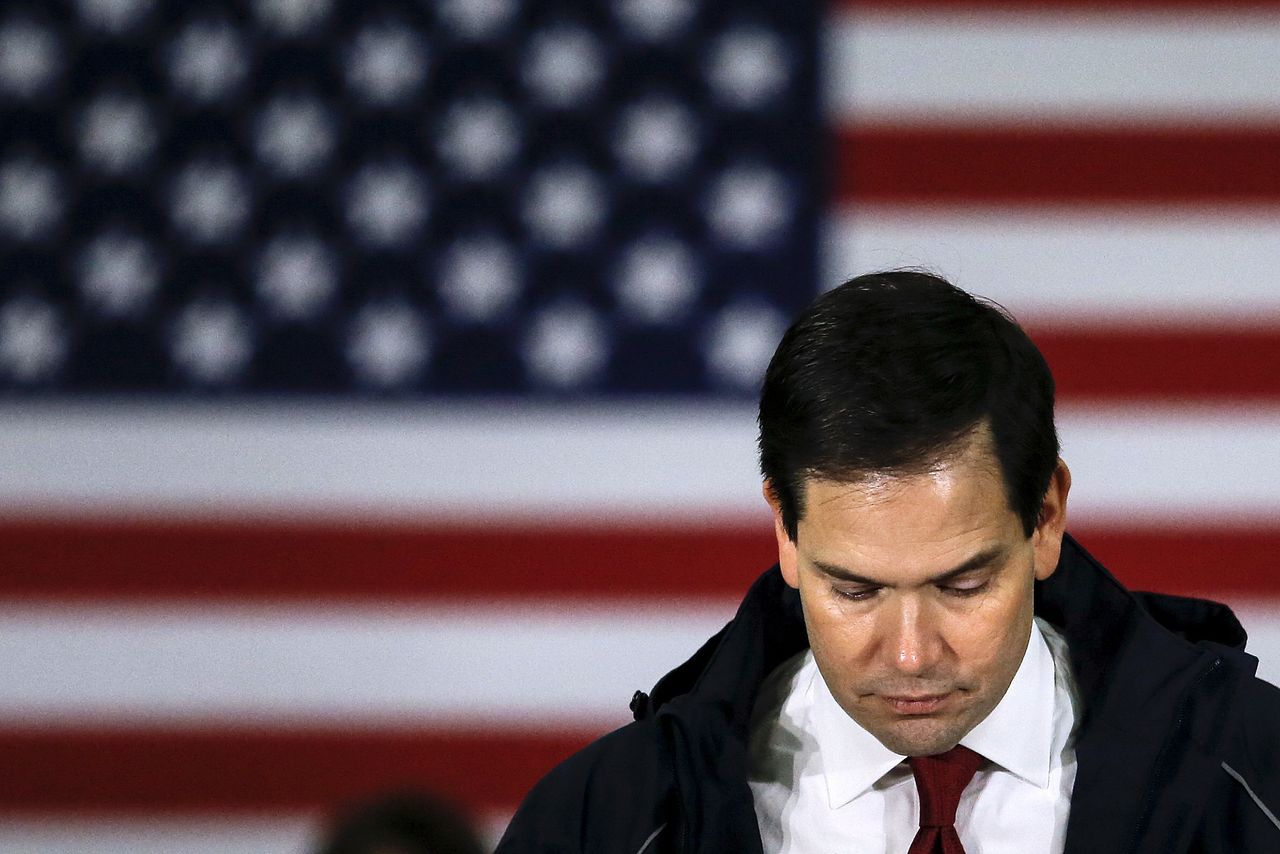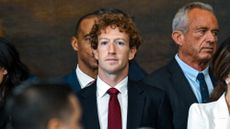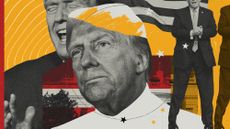Why young Christians are falling hard for Marco Rubio
Christian youth are forging a powerful connection to the Florida senator


Election seasons are long, especially when the news cycle is measured in tweets. In a week, Marco Rubio went from a third-place finish in Iowa to looking like a likely nominee to many in the Republican Party. But after his bad debate performance in New Hampshire on Saturday, he started to look like an amateur prematurely promoted beyond his rank.
These cycles can be larger than a week, of course. A little over a year ago, I argued that Marco Rubio's chances were underestimated. And a few weeks ago I argued that Rubio was consistently overestimated. Perhaps, during another low point in the Rubio cycle, it's worth explaining why Rubio is esteemed.
When I argue that Rubio's success is inflated or against his merits as a candidate, my chief antagonists tend to be people just like myself: religious, highly educated people under 40, who identify as conservatives. Without revealing names, many of them were very spooked by the recent battles over religious liberty, as in Indiana last year. They think that religious liberty is a crucial issue and imagine the fate of the institutions they support — like evangelical colleges — depends on it. Although many of them profess some ambivalence about the Republican Party, they want Republicans to win the next election to prevent a liberal president from replacing Supreme Court justices like Clarence Thomas and Antonin Scalia with left-wing jurists and ending any hope of reversing the Court's commitment to abortion rights.
Subscribe to The Week
Escape your echo chamber. Get the facts behind the news, plus analysis from multiple perspectives.

Sign up for The Week's Free Newsletters
From our morning news briefing to a weekly Good News Newsletter, get the best of The Week delivered directly to your inbox.
From our morning news briefing to a weekly Good News Newsletter, get the best of The Week delivered directly to your inbox.
Rubio is refreshing to this kind of voter for a number of reasons. Previous religious right candidates tended to blend their Christian faith within a larger American civic-religion. They would hide the theological details behind a rood-screen of "traditional values," or even "American values." Many younger Christians find that rhetoric to be stale, distasteful, dishonest, or socially grasping. They are convinced that an earlier generation of conservative Christians witnessed a cost-less Christianity. And they believe that generation's mistakes have led to the rise of the religiously unaffiliated "nones" and a more confident, crusading secularism.
Rubio, however, gives many indications that he is willing to let his faith cost him something in politics. See how he explained to George Stephanopoulos that his "with no exceptions" stand on restricting abortion is rooted in principle, even if that puts him at odds with the sentiments of a majority of Americans. "The broader point I've made, however, is I believe all human life is worthy of the protection of our laws," Rubio said. "That's what I deeply and personally believe. And I'm not going to change my position on something of — that is so deep in me in order to win an election."
These voters appreciate that Rubio is willing to talk about religious faith on its own terms, as in the video of him responding to an atheist at a campaign event. This video has gone viral among religiously engaged Facebook users, in part because it showcases Rubio doing two things that young religious conservatives aspire to do: 1. boldly proclaim a faith that influences "every part of my life," as Rubio put it, while remaining winsome; 2. explain why their faith is good on terms non-believers might understand, or at least accept. Rubio even outlines his faith in theological terms. He hired a faith outreach director, Eric Teetsel, who was a signatory to the Manhattan Declaration, a Christian manifesto. In his biography, Rubio explains his return to the Catholic Church with references to the kind of theologically serious authors that Catholics read today.
In other words, Rubio is the kind of Christian who young Christians believe is truly committed to his faith and who won't embarrass them constantly. That is a powerful connection for young voters who mostly sense that their faith is merely (and barely) tolerated in the elite circles of culture that they aspire to influence.
Many of these young people are less troubled by Rubio's previous support for comprehensive immigration reform because they too saw "welcoming the stranger" as part of their religious duty and a handy way of signaling that they were not committed to any political orthodoxy, not even a conservative one, that would impinge on their creed. They are unlikely to be moved by rumors about Rubio's hard-partying youth, as they experienced or succumbed to similar temptations themselves.
For many of the reasons above, I also find Marco Rubio the most relatable candidate in the 2016 Republican race. But I haven't fallen in love with Marco Rubio, as many of his fans (and my friends, and peers) have. I suspect he would still support an immigration bill as badly conceived as the Gang of Eight. And his rhetoric on foreign policy promises a return to the worst excesses of the Bush years: knocking over regimes in the Middle East, when the United States can make no promises as to the kind of order that will emerge from their downfall. And I would remind Rubio's fans, my friends, and peers of the costs this foreign policy has imposed on our co-religionists in Syria, Iraq, and throughout the world.
Sign up for Today's Best Articles in your inbox
A free daily email with the biggest news stories of the day – and the best features from TheWeek.com
Michael Brendan Dougherty is senior correspondent at TheWeek.com. He is the founder and editor of The Slurve, a newsletter about baseball. His work has appeared in The New York Times Magazine, ESPN Magazine, Slate and The American Conservative.
-
 6 charming homes for the whimsical
6 charming homes for the whimsicalFeature Featuring a 1924 factory-turned-loft in San Francisco and a home with custom murals in Yucca Valley
By The Week Staff Published
-
 Big tech's big pivot
Big tech's big pivotOpinion How Silicon Valley's corporate titans learned to love Trump
By Theunis Bates Published
-
 Stacy Horn's 6 favorite works that explore the spectrum of evil
Stacy Horn's 6 favorite works that explore the spectrum of evilFeature The author recommends works by Kazuo Ishiguro, Anthony Doerr, and more
By The Week US Published
-
 Will Trump's 'madman' strategy pay off?
Will Trump's 'madman' strategy pay off?Today's Big Question Incoming US president likes to seem unpredictable but, this time round, world leaders could be wise to his playbook
By Sorcha Bradley, The Week UK Published
-
 US election: who the billionaires are backing
US election: who the billionaires are backingThe Explainer More have endorsed Kamala Harris than Donald Trump, but among the 'ultra-rich' the split is more even
By Harriet Marsden, The Week UK Published
-
 US election: where things stand with one week to go
US election: where things stand with one week to goThe Explainer Harris' lead in the polls has been narrowing in Trump's favour, but her campaign remains 'cautiously optimistic'
By Harriet Marsden, The Week UK Published
-
 Is Trump okay?
Is Trump okay?Today's Big Question Former president's mental fitness and alleged cognitive decline firmly back in the spotlight after 'bizarre' town hall event
By Harriet Marsden, The Week UK Published
-
 The life and times of Kamala Harris
The life and times of Kamala HarrisThe Explainer The vice-president is narrowly leading the race to become the next US president. How did she get to where she is now?
By The Week UK Published
-
 Will 'weirdly civil' VP debate move dial in US election?
Will 'weirdly civil' VP debate move dial in US election?Today's Big Question 'Diametrically opposed' candidates showed 'a lot of commonality' on some issues, but offered competing visions for America's future and democracy
By Harriet Marsden, The Week UK Published
-
 1 of 6 'Trump Train' drivers liable in Biden bus blockade
1 of 6 'Trump Train' drivers liable in Biden bus blockadeSpeed Read Only one of the accused was found liable in the case concerning the deliberate slowing of a 2020 Biden campaign bus
By Peter Weber, The Week US Published
-
 How could J.D. Vance impact the special relationship?
How could J.D. Vance impact the special relationship?Today's Big Question Trump's hawkish pick for VP said UK is the first 'truly Islamist country' with a nuclear weapon
By Harriet Marsden, The Week UK Published